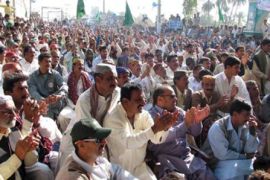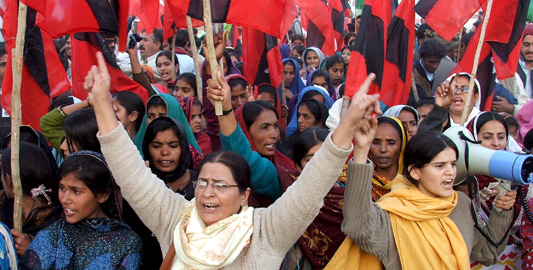Voters in a quandary
Even if they overcome security fears, there is the dilemma of whom to vote for.

 |
| A civil society group says 7.5 million of the 81 million voters were missing from the rolls and millions of fake voter registration cards was in circulation [EPA] |
Pakistanis will head to the polls on Monday in circumstances which are considered unusual even by the standards of the South Asian nation’s chequered voting history.
While the assassination of Benazir Bhutto, the former prime minister, looms large over these polls, the voter is faced not only with which candidate to elect but also the fear of violence.
| Special report |
Newsweek and the Economist were only stating the obvious when they recently described Pakistan, as “the most dangerous place in the world”; there were 58 suicide bombings last year alone.
Even poll officials in some areas are reluctant to report for duty.
In Peshawar, in Pakistan’s North West Frontier province, Naeem Iqbal, the additional sessions judge, ordered the arrest of 138 poll officials last week for failing to show up.
“This is a forced duty,” one poll official said on the condition of anonymity.
“But I can’t risk losing my job, even though the risk to my life is perhaps greater”.
Heavy security
Some 81,000 troops made up of 34,000 regular army personnel and 47,000 Rangers, Frontier Corps and Frontier Constabulary men have been deployed to secure 8,923 “most sensitive” polling stations.
Despite the deployment, General Ashfaq Pervez Kayani, the army chief, has taken pains to assert that his troops will have nothing to do with the conduct of the vote itself, which he says, is the domain of the Election Commission of Pakistan.
Kayani’s declared detachment is being seen as a welcome departure from the days of Pervez Musharraf, his predecessor and the current president.
However, ordinary Pakistanis are dismissive of the Election Commission.
To begin with, Qazi Muhammad Farooq, the current election commissioner, was appointed by Musharraf. He was pilloried for accepting Musharraf’s nomination papers for last September’s presidential election.
Credibility gap
Many Pakistanis also doubted the Election Commission’s impartiality when it postponed the elections originally slated for January 8 following Bhutto’s assassination.
Her party – the Pakistan People’s Party (PPP) – and other main opposition contenders wanted the elections to be held as planned. Many say the postponement was to give the beleaguered Pakistan Muslim League-Quaid (PML-Q), Musharraf’s allies and main partner in the last ruling coalition, time to regroup following the assassination, which had given the PPP a sympathetic boost.
The Election Commission has been lambasted for its inability to stop influential officials of local governments from publicly supporting and promoting the election campaign of favoured candidates, who mostly belong to the PML-Q.
It has also received thousands of complaints – backed by evidence – of vote rigging but these have been largely ignored. Many of these complaints were supported by independent poll monitors.
Nasim Zehra, a security analyst and political commentator, said: “The Election Commission’s inability to redress not even five per cent of the thousands of complaints that major contesting parties submitted underscores the absence of the authority that it requires to fulfil its constitutional mandate.”
Missing voters
Last year, the PPP filed a petition with the Supreme Court (headed by the now-deposed chief justice Iftikhar Chaudhry), saying that some 30 million voters were disenfranchised even before Bhutto returned home.
At the centre of this controversy was the issue of identity cards. The Election Commission had said that only computerised national identity cards would be valid for voting.
The commission said the missing 30 million voters represented the number of citizens who had yet to obtain the cards. The PPP felt it hit their voter base, particularly in the rural areas, who did not possess them.
|
Main parties |
|
Pakistan People’s Party: Late Benazir Bhutto’s party is now led by her widower Asif Ali Zardari and son Bilawal Bhutto Zardari. An arrow is its symbol on the ballot.
Pakistan Muslim League-N: Led by two-time prime minister Nawaz Sharif, the party is fiercely opposed to Musharraf. The tiger is its symbol on the ballot.
Pakistan Muslim League-Q: The ruling party after the 2002 poll, it supports Musharraf. A bicycle is its symbol on the ballot.
In Monday’s election 106 parties are contesting, of which 15 were represented in the last parliament.
In 2002 the PML-Q won 130 seats and three allied parties won another 53 seats. The PPP had 63 seats; an alliance of six hardline Islamic parties called the Muttahida Majlis-e-Amal or United Action Front won 59 and the PML-N won 18. Smaller parties, including that of Imran Khan, nationalist groupings and independents won 19. |
The poll body initially dithered, saying there was too little time left to issue millions of new cards and therefore, the electoral lists would be difficult to revise.
However, the deposed chief justice admonished the commission and ordered it to set the record straight within one month. It then caved in and agreed to let people vote even with the old cards.
But the issue rose to the surface again, last week when the Free and Fair Election Network (Fafen), a coalition of 30 leading Pakistani civil society organisations that came together to observe the poll process, educate voters and advocate electoral and democratic reforms, said 7.5 million of the 81 million registered voters were missing since a similar electoral tally in June.
Fafen also talked of millions of fake voter registration cards.
The Election Commission has denied these charges.
Despite the security threat and fear of vote rigging, Pakistani civil society groups says Bhutto’s assassination has reinforced the need to “make a difference” and is urging people to vote.
Zehra is in no doubt about the value of the ballot.
“Our vote is the only lever of change we have in our hands. Pakistanis need to stand up and be counted. Just sitting around and criticising will not do. We must vote,” she said.
But even if Pakistanis do brave the security threats and head to the polls there is the dilemma of whom to vote for.
This is particularly acute for undecided voters, given to choosing either Bhutto’ PPP or the Pakistan Muslim League- N (PML-N) headed by Nawaz Sharif, the former prime minister.
Kamila Shamsie, an acclaimed novelist, seems to personify the feeling among urban voters torn by sympathy for the slain Bhutto and Sharif’s chutzpah.
She told The Guardian this week: “As for me, I’m going to vote to show support for a process which, however flawed, is leagues ahead of any alternative. Who I’ll vote for — well, that’s a question to which I still don’t have an answer for.”
Hopefully, the final result would not be decided on the toss of a coin.
The writer is News Editor at Dawn News, an independent Pakistani TV channel.
